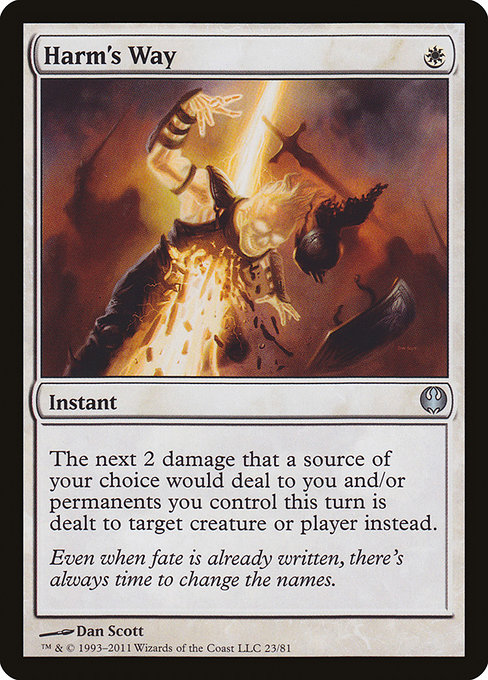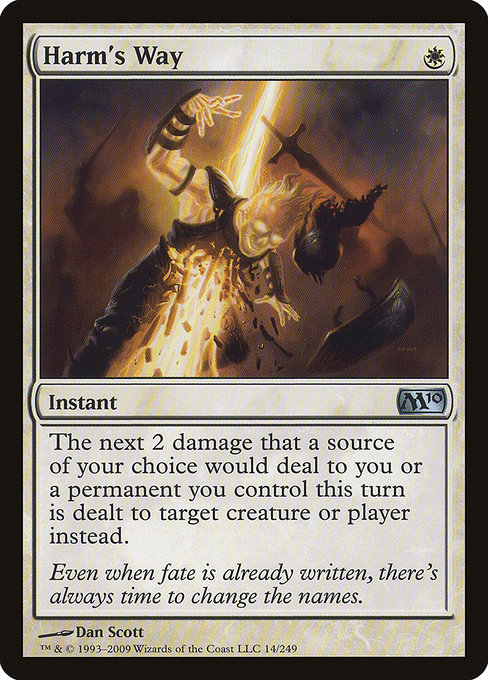standard
future
historic
gladiator
pioneer
explorer
modern
legacy
pauper
vintage
penny
commander
brawl
alchemy
paupercommander
duel
oldschool
premodern
Rulings
If the chosen source would simultaneously deal damage to multiple permanents you control (like Pyroclasm could) or to you and at least one permanent you control (like Earthquake could), Harm’s Way will redirect just 2 of that damage. It won’t redirect the next 2 damage that would be dealt to each recipient. You choose which 2 damage is redirected. If you like, you can choose to redirect 1 damage that would be dealt by the chosen source to each of two different recipients.
Harm’s Way has no effect on damage that’s already been dealt.
After Harm’s Way resolves, it no longer checks to see if the target is a legal target. However, if that permanent or player can’t be dealt damage at the time the chosen source would deal damage (perhaps because the creature is no longer on the battlefield or is no longer a creature, or because the player is no longer in the game), the damage can’t be redirected. It’s dealt to the original recipient.
If the chosen source would deal just 1 damage to you or a permanent you control, Harm’s Way’s effect will redirect that damage and still have a “shield” left for another 1 damage from that source later in the turn.
As you cast Harm’s Way, you target that the redirected damage will be dealt to. As Harm’s Way resolves, you choose a source of damage. You never choose the original recipient of the damage; Harm’s Way will apply to whatever the chosen source tries to deal damage to, as long as it’s you or a permanent you control.
Harm’s Way has no effect on damage that’s already been dealt.
After Harm’s Way resolves, it no longer checks to see if the target is a legal target. However, if that permanent or player can’t be dealt damage at the time the chosen source would deal damage (perhaps because the creature is no longer on the battlefield or is no longer a creature, or because the player is no longer in the game), the damage can’t be redirected. It’s dealt to the original recipient.
If the chosen source would deal just 1 damage to you or a permanent you control, Harm’s Way’s effect will redirect that damage and still have a “shield” left for another 1 damage from that source later in the turn.
As you cast Harm’s Way, you target that the redirected damage will be dealt to. As Harm’s Way resolves, you choose a source of damage. You never choose the original recipient of the damage; Harm’s Way will apply to whatever the chosen source tries to deal damage to, as long as it’s you or a permanent you control.
Rulings
If the chosen source would simultaneously deal damage to multiple permanents you control (like Pyroclasm could) or to you and at least one permanent you control (like Earthquake could), Harm’s Way will redirect just 2 of that damage. It won’t redirect the next 2 damage that would be dealt to each recipient. You choose which 2 damage is redirected. If you like, you can choose to redirect 1 damage that would be dealt by the chosen source to each of two different recipients.
Harm’s Way has no effect on damage that’s already been dealt.
After Harm’s Way resolves, it no longer checks to see if the target is a legal target. However, if that permanent or player can’t be dealt damage at the time the chosen source would deal damage (perhaps because the creature is no longer on the battlefield or is no longer a creature, or because the player is no longer in the game), the damage can’t be redirected. It’s dealt to the original recipient.
If the chosen source would deal just 1 damage to you or a permanent you control, Harm’s Way’s effect will redirect that damage and still have a “shield” left for another 1 damage from that source later in the turn.
As you cast Harm’s Way, you target that the redirected damage will be dealt to. As Harm’s Way resolves, you choose a source of damage. You never choose the original recipient of the damage; Harm’s Way will apply to whatever the chosen source tries to deal damage to, as long as it’s you or a permanent you control.
Harm’s Way has no effect on damage that’s already been dealt.
After Harm’s Way resolves, it no longer checks to see if the target is a legal target. However, if that permanent or player can’t be dealt damage at the time the chosen source would deal damage (perhaps because the creature is no longer on the battlefield or is no longer a creature, or because the player is no longer in the game), the damage can’t be redirected. It’s dealt to the original recipient.
If the chosen source would deal just 1 damage to you or a permanent you control, Harm’s Way’s effect will redirect that damage and still have a “shield” left for another 1 damage from that source later in the turn.
As you cast Harm’s Way, you target that the redirected damage will be dealt to. As Harm’s Way resolves, you choose a source of damage. You never choose the original recipient of the damage; Harm’s Way will apply to whatever the chosen source tries to deal damage to, as long as it’s you or a permanent you control.
Your collection? Your decks?
Want to manage your collection and/or create decks?


 0
0
 0.24€
0.24€
